Fault Lines
Charlie Hazard has been around the block a time or two. A combat veteran who works security to pay the bills, he’s picked up his share of scars—and shrapnel too. But when a beautiful, mysterious psychologist asks for his help, Charlie is plunged into an international conspiracy that will call on every survival tool he has. Fault Lines, the newest offering from award-winning author Thomas Locke, is a no-holds-barred thriller.
What sets *Fault Lines *apart is its careful exploration of ethics, psychology, quantum physics, and spiritual principles. Although that may sound out of place in a gritty thriller, the search for self-knowledge and exploring the farther reaches of the human mind fit in nicely with the novel’s themes. The scientist who’s hunting Charlie and his client, the lovely Gabriella Speciale, explains coalescing field theory: “Any quantum entity, such as a single electron, can influence another entity, regardless of space and time. The effects are instantaneous and can theoretically occur over any distance.” What that actually means is that psychological phenomena, such as teleportation or astral projection, can be used for spying, defense, and surveillance.
Locke’s familiarity with his genre comes through cleanly. His hero has scars in all the right places, and every woman who flits through Fault Lines is not only dangerously beautiful but whip smart as well. But it’s the book’s landscapes that breathe here. Deals are made over “a jelly jar of tea in \[a\] windowless wheelhouse, the flies and mosquitoes kept out by rusty screens and duct tape.” Florida, in all its muggy glory, takes center stage: “The coastal route was summertime empty, a lonely asphalt ribbon laid along the narrow strip of land separating the Atlantic from the Indian River.” It’s as sultry as Locke’s heroine, and as dangerous.
At first glance, Fault Lines is a well-constructed thriller, packed with its quota of action and just the right number of plot twists. But a closer look reveals gorgeous, evocative writing, and a deeper exploration of what it really means to be human—and what happens when that’s up for sale.
Reviewed by
Claire Rudy Foster
Disclosure: This article is not an endorsement, but a review. The publisher of this book provided free copies of the book to have their book reviewed by a professional reviewer. No fee was paid by the publisher for this review. Foreword Reviews only recommends books that we love. Foreword Magazine, Inc. is disclosing this in accordance with the Federal Trade Commission’s 16 CFR, Part 255.

